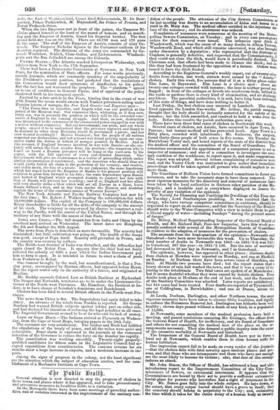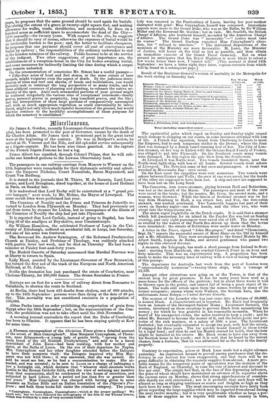Vuklit tra1t4.
General attention is now directed to stop the progress of cholera in those towns and places where it has appeared, and to take precautionary and preventive measures in localities liable to a visitation. In the Metropolis there have been some meetings of parochial author- ities, and of societies interested in the improvement of the sanitary con-
dition of the people. The attention of the City Sowers Commission at its last meeting was drawn to an accumulation of hides and horns in a yard in St. Mary Axe. The medical officer certified to the injurious as. ture of the nuisance ; and its abatement was ordered.
Complaints of nuisances were numerous at the meeting of the Metro- politan Sewers Commission, on Tuesday ; and in every case peremptory orders for their removal were issued. The infamous open ditch at Wandsworth, which was the cause of so many deaths in Albion Terraee, Wandsworth Road, and which still remains uncovered, was also brought under discussion by a deputation ; who represented that the drainage at Clapham is generally defective, and requested that the Commiesiouere, if they could not close the ditch, would have it periodically flushed. Ti Chairman said, that efforts had been made to cleanse the ditch; but in this they had been frustrated by the opposition of a farmer. Orders were issued to have the ditch flushed.
According to the Registrar-General's weekly report, out of twenty-nine deaths from cholera, last week, sixteen were caused by the "Asiatic" cholera. Early this week, five persons died of it at a filthy place caned Elm Lane, in Bayswater. Elm Lane is a choice spot : there are twenty-one cottages crowded with inmates; the lane is neither paved nor flagged • in front of the cottages or hovels are mushroom-beds, behind in the yards or gardens there is every kind of abomination, and no drainage anywhere. The parochial authorities, it is said, have long been informed of this state of things, and have done nothing to better it, Last Friday, the first cholera case occurred in Larabetb. The victim lived opposite the London Gas-works. Mr. Arthur, the parish surgeon thought that the body should be instantly removed for the safety of the inmates ; but the Irish assembled, and resolved to hold a wake over the body. Before this resolve the parish authorities gave way.
There have been three fatal eases of cholera in Southwark this week. Several eases of cholera not Asiatic, have occurred in Agar Town, St.
Pancras ; but instant medical aid has prevented death. Agar Town is a filthy place, crowded with inhabitants; Mr. Sutheron the surgeon, found thirty-three people of both sexes in five rooms. On Tuesday the Marylebone Vestry met, and heard reports of the state of the district from the medical officer and the committee of the Board of Guardians. The committee recommended the appointment of a competent person to act as inspector of nuisances ; and also of a committee to investigate the sani- tary condition of the workhouse to report upon it, and make suggestions. The report was adopted. Several letters complaining of nuisances were read, and the Vestry Clerk was instructed to give notice that immediate proceedings would be taken against all persons who should neglect to re- move them.
The Guardians of Holborn Union have formed committees to ferret out nuisances, and to take the necessary steps to have them removed. The most vigorous measures for the discovery and removal of nuisances have been taken by the local authorities in thirteen other parishes of the Me- tropolis; - and a laudable zeal is everywhere displayed to lessen the severity of any visitation of the epidemic. The Society for Cleansing and Purifying the Dwellings of the Poor met on Tuesday ; Lord Southampton presiding. It was resolved that the clergy, who have various competent committees in existence, alaonld be requested to report on all nuisances ; and that the Secretary of the Society should write to the Water-Companies with a view to induce them to give a liberal supply of water—including Sundays "during the present sessan of danger."
Dr. Milroy, Medical Superintending-Inspector of the General Board of Health, and Mr. Richard Hall, Poor-law Inspector, have this week-per- sonally conferred with several of the Metropolitan Boards of Guardians in relation to the adoption of measures for the prevention of cholera. - The accounts from the head-quarters of the epidemio—Newcastle and Gateshead—have been more favourable this week. Up to Thursday, the total number of deaths in Newcastle was 1342—in 1831-'2 it was 212; in Gateshead, 367 this year—in 1831-'2 136. But the rate of mortality had decreased to 29 per day in Newcastle, and 7 in Gateshead.:.-
The epidemic, however, has appeared in other places : thirteen deaths from cholera at 'Howden were reported on Monday, and one at Sheffield on Sunday. At Durham there have been severe cases of diarrhea, one fatal. At Shields two persons have died ; but the report states that a heavy shower of rain had washed the town, and that it was a cause of re- joicing to the inhabitants. Two fatal cases are spoken of at Marichester ; but it seems doubtful whether they were caused by Asiatic cholera. Four deaths took place at Bertha= at the end of last week, and the Secretary of the Sanitary Committee was attacked. Later reports are satisfactory; but 844 cases had been treated. Four deaths are reported at Tynemouth; one at Coldingham, in Berwickshire ; and one at Dunse, across the Border.
At Leeds, Durham, Darlington, and other Northern towns, the most vigorous measures have been taken to cleanse filthy localities, and rigidly to enforce the Nuisances Removal Act. Darlington has hitherto been very healthy ; eleven days passed without a death of any kind, in a population of 12,000.
At Newcastle, some members of the medical profession have held a meeting, and passed resolutions censuring Mr. Grainger, the officer from the General Board of Health, for inefficiency, and the Board of Guardians and others for not consulting the medical men of the place on the ar- rangements necessary. They also demand a public inquiry into the•cause of the excessive mortality at Newcastle and Gateshead.
The Inspectors of the General Board of Health have put in force a local act at Newcastle which enables them to close houses unfit _for human habitation.
One impression cannot fail to be made on every reader of the journals —that the cholera falls with fatal severity upon unclean pleees and per- sons, and that those who are intemperate and those who have not enough are the most likely to become its victims ; also, thatiear of the scourge induces an attack.
Mr. John Simon, the Officer of Health, has addressed a long and able introductory report to the Improvement Committee of the City Com- missioners of Sewers, on extramural interments. It appears that the Commissioners are bound by their act to provide a sufficient extramural burial-place for persons who heretofore had a right of interment in the City. Mr. Simon goes fully into the whole subject. He lays down, at the outset, that every corpse buried should have a grave to itself; that the cemetery should belong in perpetuity to the City ; and, estimating the time whuieht takes for the entire decay of a human body et Went/ vats, he proposes that the same ground should be used again for burials. Dalculating the extent of a grave at twenty-eight square feet, and making allowance for walks, roads, shrubberies, and memorials, he fixes on a hundred acres as sufficient space to accommodate the dead of the City- 3200 annually—for twenty years. With respect to the site, he suggests that it should be easy of access, otherwise the expenses of burial would be an intolerable burden to the poor; and, the better to facilitate cheapness, ha proposes that one payment should cover all cost of conveyance and burial by railway ; the responsibilities of the ordinary undertaker to end at the London terminus of the railway. Public hearses to be at the service of the indigent. Two other suggestions of great importance are, the establishment of a reception-house in the City for bodies awaiting burial, and some measures for indirectly limiting the time during which a corpse may -remain unburied.
On the ornamentation of cemeteries Mr. Simon has a useful passage-
6, Fifty-four acres of head and foot stones, or the same extent of bare mounds, might vulgarize even the aspect of death. By the judicious intro- duction of trees and turf and shrubs, of bends and modulations, you would probably seek to interrupt the long perspective of so many tombs, and by these artificial resources of planning and planting, to enhance the native so- lemnity of the spot. Amid such ornamental portions of your ground might be scattered irregularly the various sites of exceptional interment—family
i
graves, personal graves n perpetuity, long leasehold graves, and the like ; and the interposition of these large portions of comparatively unoccupied sap, with as much appropriate vegetation as could conveniently be intro- duced, might not only allow much tasteful decoration of the ground, but would likewise conduce to the healthful accomplishment of those purposes for which the cemetery is established."



























 Previous page
Previous page